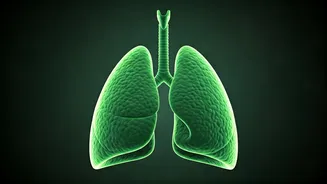Food and Lungs
The connection between food and lung health is often underestimated. What we eat significantly influences our respiratory system's ability to function
properly. Certain foods can trigger inflammation, mucus production, and oxidative stress, all of which compromise lung function. It is imperative to be aware of how dietary choices affect our lungs. This understanding empowers us to make smarter choices. This knowledge can lead to a considerable improvement in our overall respiratory health. This includes the ability to breathe without any discomfort. The aim is to make our lungs function at their best.
Processed Foods
Processed foods, laden with preservatives, artificial additives, and unhealthy fats, can be detrimental to lung health. These foods often lead to systemic inflammation throughout the body, including the lungs. Inflammation can constrict airways, increasing the risk of respiratory problems such as asthma and chronic obstructive pulmonary disease (COPD). The high sodium content in many processed foods also causes water retention, which can exacerbate breathing difficulties. Avoiding these foods helps minimize the inflammatory load on the respiratory system, supporting better lung function. This includes foods like packaged snacks, frozen meals, and fast food items. Reading labels and preparing fresh meals are essential steps towards respiratory wellness.
Sugary Beverages
Sugary drinks are often overlooked when considering dietary impacts on health. However, their contribution to poor respiratory health is considerable. High sugar intake promotes inflammation, increasing susceptibility to respiratory infections and worsening conditions like asthma. Moreover, the empty calories in these beverages can lead to weight gain, which puts additional strain on the lungs. Excess weight reduces lung capacity, making breathing harder. Switching to water, herbal teas, or naturally flavored drinks significantly helps improve lung function. Regularly consuming sugary drinks is a factor in increased mucus production in the lungs. It further impedes the ability to breathe freely. This change in diet is crucial for supporting lung function.
Refined Carbohydrates
Foods high in refined carbohydrates, such as white bread, pasta, and pastries, often lack essential nutrients and can contribute to respiratory issues. These carbs are quickly broken down into glucose, causing spikes in blood sugar that can trigger inflammation. Inflammation can lead to airway constriction and increased mucus production, making breathing difficult. Additionally, the lack of fiber in refined carbs slows digestion, which can lead to bloating, placing pressure on the diaphragm and restricting lung capacity. Choosing whole-grain alternatives, which are rich in fiber and release glucose more slowly, is more beneficial for lung health. This dietary change reduces inflammation and promotes more effective breathing.
Dairy Products
Dairy products can impact respiratory health, particularly for those with sensitivities or allergies. Dairy consumption, in some individuals, can trigger increased mucus production in the respiratory tract. Excessive mucus can clog airways, creating a breeding ground for infections and causing breathing difficulties. For individuals sensitive to dairy, symptoms can include coughing, wheezing, and chest congestion. While dairy products provide essential nutrients, those prone to respiratory issues may consider reducing or eliminating them from their diet. This allows them to assess whether breathing improves. There are many non-dairy alternatives available. These can help maintain a balanced diet while minimizing respiratory symptoms.
Salty Foods
Excessive sodium intake, frequently found in salty foods, can negatively affect lung health. High sodium levels can lead to fluid retention, which puts extra strain on the respiratory system. Fluid buildup in the lungs makes breathing more difficult and can worsen existing respiratory conditions. Additionally, high-sodium diets are often associated with high blood pressure, which can damage the delicate blood vessels in the lungs, increasing the risk of respiratory complications. Reducing sodium consumption involves limiting processed foods, avoiding excessive salt use in cooking, and choosing fresh, unprocessed ingredients. This helps maintain healthy fluid balance and supports optimal lung function. This will greatly improve the breathing experience.
Fried Foods
Fried foods are often prepared using unhealthy fats, which can trigger inflammation and negatively impact lung health. The high fat content in these foods can lead to weight gain, putting increased pressure on the lungs and decreasing lung capacity. Moreover, the cooking process can create harmful compounds that can irritate the respiratory tract. Breathing in the fumes released from fried foods can further exacerbate respiratory issues. Opting for healthier cooking methods, such as baking, grilling, or steaming, can help maintain respiratory wellness. Making these simple changes and avoiding fried foods are critical to maintain a healthy respiratory system. The health benefits will be apparent quickly.















